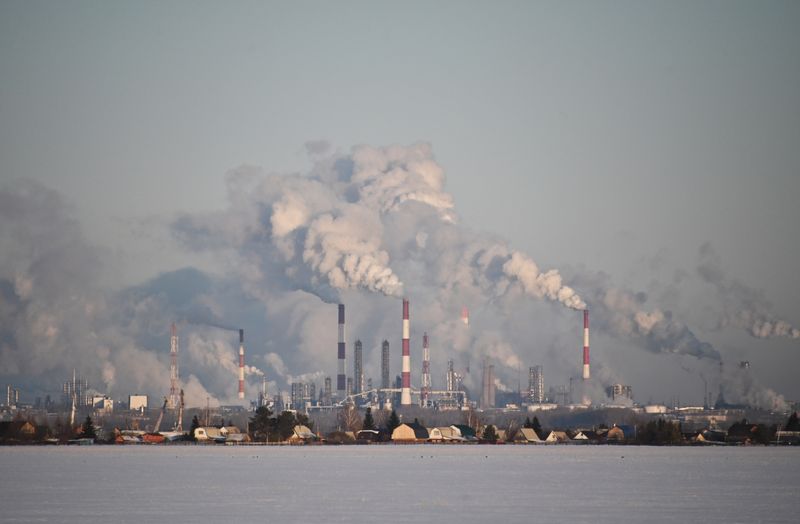By Ron Bousso, Julia Payne and Dmitry Zhdannikov
LONDON (Reuters) - Russian oil trade was in disarray on Tuesday as producers postponed sales, importers rejected Russian ships and buyers worldwide searched elsewhere for needed crude after a raft of sanctions imposed on Moscow over the war in Ukraine.
Numerous nations imposed sweeping sanctions against Russian companies, banks and individuals following Russia's invasion of Ukraine last week and global majors announced plans to leave multi-million-dollar positions in Russia.
U.S., European and other governments exempted energy trade from sanctions to prevent already tight markets rallying further, but that has failed.
Global benchmark Brent crude settled at nearly $105 a barrel on Tuesday, its highest since August 2014, as refiners, traders and oil majors steer clear of Russia, out of an abundance of caution that they may unwittingly run afoul of sanctions somewhere.
Russia is the second largest exporter of crude worldwide, trailing only Saudi Arabia, as it ships out 4 million to 5 million barrels per day (bpd) of crude, along with 2 million to 3 million bpd of refined products. With demand already surging past pre-pandemic levels and major producers struggling to keep up, market players are increasingly fearful that prices will keep rising.
The knock-on effects of sanctions were felt all across the oil market on Tuesday. Russia's key Urals oil grade was bid at a discount of more than $18 below physical Brent crude, the primary worldwide benchmark, a record in the post-Soviet era. Even at that price, traders have been unable to find willing buyers.
"Nobody wants to buy, ship or store Russian oil," a trader of Russian oil said.
In response to the severity of the disruption, the International Energy Agency (IEA) said it would coordinate a release of 60 million barrels of oil reserves from big consumers, with half coming from the United States.
The market responded by rallying even more, seeing the release - the equivalent to less than a day's worldwide oil consumption - as underscoring the worldwide supply crunch.
Traders in futures markets aggressively pushed the price of current Brent contracts to more than $15 higher than contracts that will deliver oil six months from now. That was also a record, and indicative of growing worries about tight supply. [nL8N2V47B1]
SHUNNING RUSSIAN BARRELS
Even non-Russian oil has been snagged in the turmoil.
Five traders who spoke with Reuters said buyers were avoiding oil delivered by the CPC pipeline - which delivers more than 1 million bpd from Kazakhstan, or over 1% of world supply - because it can mix with Russian grades and terminates at a Russian port on the Black Sea, traders said.
"It's an important source of supply - over a million barrels a day - into a world which right now really needs that oil supply," Chevron Chief Executive Mike Wirth said in a Tuesday call with reporters.
Chevron Corp (NYSE:CVX) has a 15% stake in CPC and a 50% stake in Tengizchevroil (TCO), which is developing crude oil fields in western Kazakhstan.
Rival energy firms BP (LON:BP), Equinor and Shell (LON:RDSa) have abandoned multibillion-dollar positions in Russia, and BP has already cancelled all of its fuel oil loadings from the Russian Black Sea port of Taman, sources familiar with the matter said.
Exxon Mobil Corp (NYSE:XOM) said it was pulling U.S. employees from Russia, even though it has not said it will give up operations there.
Buyers around the world were trying to secure supplies from elsewhere. State-run Indian refiner Bharat Petroleum Corp, which buys roughly 2 million barrels of Russian Urals monthly, is seeking more oil from Middle Eastern producers for April.
Canada said on Monday it would ban oil imports from Russia.
U.S. traders have started shunning Russian barrels, while Asian buyers were awaiting clarity from banks on whether they can transact with Russian sellers.
The Malaysian government said a Russian-flagged oil tanker targeted by U.S. sanctions will not be allowed to call at Kuala Linggi port.
European Union countries are considering a ban on Russian ships entering ports in the bloc. Britain said on Monday it would deny entry to British ports to all ships that are Russian owned, operated, controlled, chartered, registered or flagged.
RUSSIAN SOLUTIONS

Russia, meanwhile, is expected to boost supplies to China. Oil pipeline monopoly Transneft, which handles more than 80% of total oil produced in Russia, plans to increase supplies to China via the ESPO pipeline this month to 2.48 million tonnes from 2.22 million tonnes in February, according to TASS news agency.
Some Russian oil companies have stopped banking with sanctioned lenders, including VTB and Sberbank , and switched to those that do not face restrictions, including Rosbank, Unicredit (MI:CRDI) and Raiffeisen, five people familiar with the matter told Reuters.